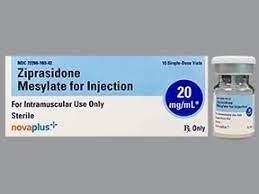A nurse is preparing to administer ziprasidone 10 mg IM every 6 hr. Available is ziprasidone 20 mg/mL. How many mL should the nurse administer per dose? (Round the answer to the nearest tenth. Use a leading zero if it applies. Do not use a trailing zero.)
The Correct Answer is ["0.5"]
To calculate the amount of ziprasidone 10 mg IM from the available concentration of 20 mg/mL, you can use the formula:
Amount (mL) = Desired Dose (mg) / Concentration (mg/mL)
Amount (mL) = 10 mg / 20 mg/mL
Amount (Ml) = 0.5 mL
Therefore, the nurse should administer 0.5 mL of ziprasidone per dose.

Nursing Test Bank
Naxlex Comprehensive Predictor Exams
Related Questions
Correct Answer is D
Explanation
A. "Using nontraditional treatments is not a good idea. I'd rather you avoid that route."
This response is directive and dismissive of the client's choice. It does not promote open communication or respect for the client's autonomy and beliefs.
B. "Your provider is very knowledgeable. If he prescribes chemotherapy, it's the best treatment for you."
While healthcare providers have expertise, this response doesn't address the client's concerns or give them an opportunity to express their feelings. It may come across as authoritarian and not respecting the client's wishes.
C. "A lot of people think nontraditional treatments will work, and they find out too late that they made the wrong choice."
This response uses scare tactics and doesn't address the client's individual needs or concerns. It does not foster a trusting and respectful nurse-client relationship.
D. "Tell me more about your concerns about taking chemotherapy."
This is the most appropriate response. It demonstrates active listening, empathy, and a willingness to understand the client's perspective. By asking the client to share more about their concerns, the nurse can engage in a meaningful conversation and provide information and support based on the client's needs.
Correct Answer is A
Explanation
A. Clients who are involuntarily admitted to a mental health unit retain their rights, including the right to informed consent. This means they must be informed about their treatment, including medications, procedures, and potential risks, and they have the right to accept or refuse treatment, unless a court order states otherwise.
B.Involuntary admission does not automatically mean forced treatment. Clients can refuse medications, unless they are deemed a danger to themselves or others, in which case a court order may be obtained to administer medication.
C.Restraint laws apply equally to all clients, regardless of admission status. Restraints must always be used as a last resort and require a provider’s order, regular assessments, and documentation.
D.Involuntary hospitalization has legal time limits, and court review is required for extended hospitalization. The length of stay varies based on state laws and judicial rulings.
Whether you are a student looking to ace your exams or a practicing nurse seeking to enhance your expertise , our nursing education contents will empower you with the confidence and competence to make a difference in the lives of patients and become a respected leader in the healthcare field.
Visit Naxlex, invest in your future and unlock endless possibilities with our unparalleled nursing education contents today
Report Wrong Answer on the Current Question
Do you disagree with the answer? If yes, what is your expected answer? Explain.
Kindly be descriptive with the issue you are facing.
